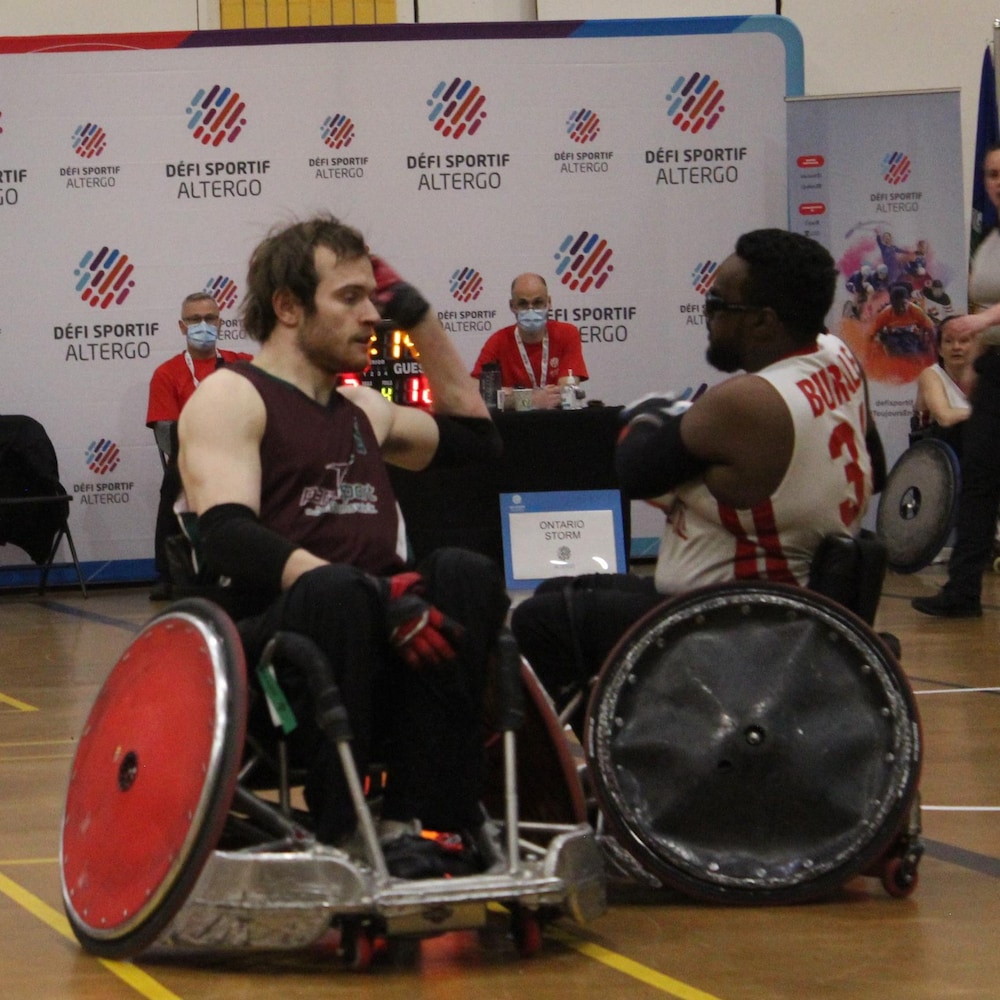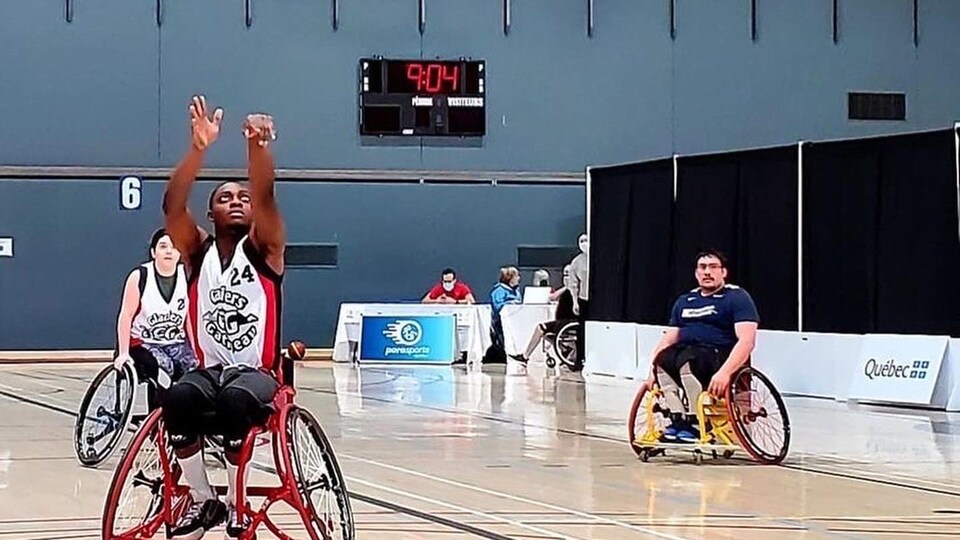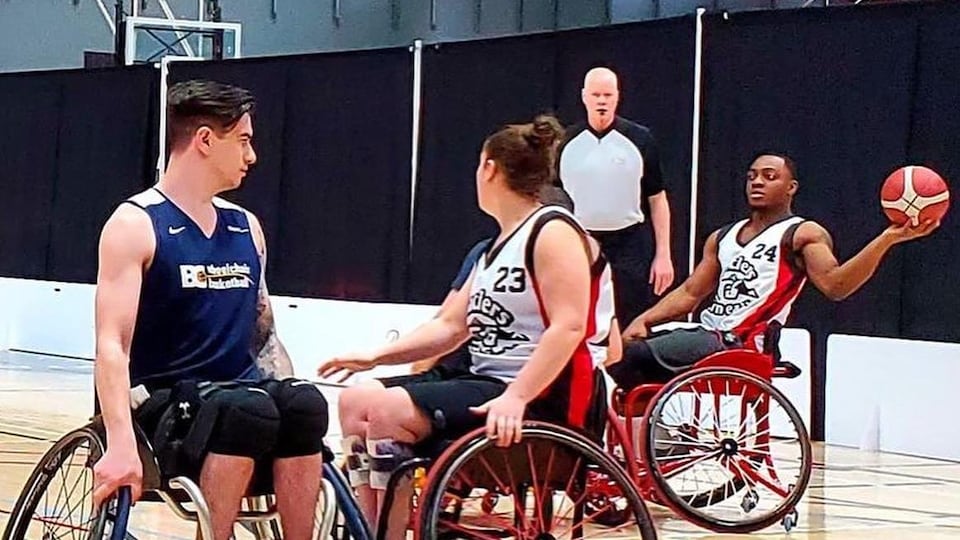The metal noise of wheelchair clashes sets the tone for the wheelchair rugby match that will take place at a sports center in Montreal’s Villeray district in the middle of Thursday afternoon. Ontario Storm and Team New Brunswick will face off in D2 of the Canadian Championships, the first to take place in two years since COVID-19.
The challenge of the Canadian title is daunting, but we can still feel the beautiful atmosphere that reigns there and the pleasure of the athletes and their entourage meeting at the tournaments.
The competition takes place during Défi sportif AlterGo, the largest event in Canada that brings together athletes with performance limitations, taking place in Montreal until May 1st.
After two years in virtual mode, it is also a return to the forefront for Défi sportif. Despite the ambient happiness, we still can’t say back to normal because there are still sanitary measures that complicate the organization, but also because we have noticed a certain drop out in sports.
In 2019, last year the Défi sportif AlterGo took place face to face, more than 8,000 para-athletes took part. This year, it’s half. Approximately 4,000 participants came to the competitions in Montreal and Longueuil.
Jérémie Brisebois, event director at Défi sportif AlterGo, puts these figures into perspective.
We have no idea what the answer will be, he told Radio-Canada Sports. We are really happy with the people and happy to have different events. We still have seven types of competitions and it’s not bad on our averages. We also make choices. By having competitions in schools, we expect to have fewer people in person. We’re happy with our 4000. We can’t wait to get back to 8000. But for a comeback, it’s better to go a little bit.
Défi sportif AlterGo is representative of participation in parasports in general. Team sports, such as rugby and wheelchair basketball or soccer power seatis particularly affected by the drop in sport, which has accelerated over the past two years.
About a third of para-athletes have not renewed their membership in the club since the start of the pandemic, according to Anne-Renée Thibault, general manager of Parasports Quebec.
The reasons for the slow return to training of parasports are the same as for other sports.
Access to the establishments was complicated, Anne-Renée Thibault recalled. After a while, when you haven’t practiced your sport, it will disappear from your routine. In some sports, it was necessary to be more vigilant because the clients were weaker. Waiting and precautionary times are boosted. It places more emphasis on stopping.
However, it should be noted that many athletes returned with great enthusiasm. This is the case of Lionel Tamoki, a 19-year-old wheelchair basketball player.
Some of his teammates did not return, but there was no question that he would give up his passion.
I sat in my office chair and just waited for an email saying, “We’re back to practice”he said.
His goal is to make the Canadian team. He was also invited to the selection camp.
He acknowledges that the pandemic has probably lasted him a year or two.
” At the start of COVID, we would have a tournament with Team Quebec, but it was canceled. The new players, we don’t have time to prove ourselves, we can’t be invited to the selection camp because they have no basis. If I had been to that tournament, I would have had a chance to be Team Canada earlier. “
Training and competitions have continued over the past few months and very quickly. Lionel Tamoki won’t complain about it, but laughingly admits he’s a bit lost on his schedule.
In March, there was no weekend where I didn’t have a tournament or training camp, I couldn’t work for five weeks. I like: tournament, tournament, training camp, tournament, but I’m not complaining.
The problem is not only a question of dropping out, but also of new memberships.
In any sport, there are always people who come out naturally, says the general manager of Parasports Quebec. But normally, there are attendees as well.
The shortage of new players is particularly acute in wheelchair basketball.
I think mini-basketball, at age 18 you no longer play mini, you move to a higher category, the general manager added. Young people continue to age despite the pandemic, but nothing has entered the system. We see that the teams are really reduced.
The stakes are high because wheelchair basketball can be withdrawn from the Quebec Games if the pool of players under 18 is not large enough to form the required number of teams.
We’re looking for a way to get past this, because the stakes are highMs. confession. Thibault.
” We really don’t want to be excluded from the Quebec Games, because the young people who deserve it, they want to go. “
In solution mode
Hiring new para-athletes has been difficult over the past two years. It is often necessary to personalize the approach according to the functional limitations of the person.
In the Beyond the Limits program, we go to rehabilitation centers, says Anne-Renée Thibault. When someone has a new condition, I think it’s important to know right away that there’s a good service offer (in parasports). It’s not perfect, but there are possibilities. And that’s one of the saddest things, it’s that we can’t reach out to people to give them hope or a new purpose.
Lionel Tamoki’s first interaction with wheelchair basketball happened through a chance encounter.
I have always been a fans of basket ball. In secondary 1, I came back from my lessons carrying my ball and I dribbled down the street and, suddenly, there was Marc Antoine Ducharme, who was coach of the Canadian women’s team, and who saw me and said to me: “I work on the field and would you be interested in playing?
It was finally two years later that he would learn to wheelchair basketball after he realized his disability would not allow him to be part of his school’s standing basketball team. The coach contacted the parasport and that was the spark plug.
I was immediately hooked and I expected it, he recalls. I know I’ll love it, it’s basketball! And I have a chance to be strong.
Failing to show up at rehabilitation centers during the pandemic, Parasports Quebec had to find another solution. He turned to health professionals by training them and informing them about parasports so that they could be their transmission belt.
A fruitful initiative.
We opened the doors to centers we didn’t really know, acknowledging the general manager. We will get to know more people in more regions.
Both at Parasports Québec and at Défi sportif AlterGo, there is no question of setting a goal to return to participation numbers for 2019. Leaders would rather go daily because the pandemic is not over, as unpredictable which is associated with it. ito.
However, the reflection is well conducted. One of the solutions: offer more activity during the summer, where COVID-19 often stops. Historically, our sports have been winter or indoor sports. We are trying to do thisemphasizes Anne-Renée Thibault.
” For example, in mini basketball, we consider the annual championship at the end of the summer. A kind of Quebec Cup to bring together the youth. And we’ll try to offer it out or play three against three. You need to be creative and not be discouraged and wait to do what you were doing before. “
The situation could yield interesting initiatives. The lack of players on one level is forcing teams to come together, as at the previous Canadian Wheelchair Basketball Championships that took place in mid-April in Montreal, where Manitoba and New Brunswick joined forces.
The regions and provinces have a good relationship, because they want to play. In a normal year, this would not happen.launching with a smile Anne-Renée Thibault.
After two years in virtual mode, Lionel Tamoki is happy to participate again in Défi sportif AlterGo, a tournament he loves.
The AlterGo Challenge has a more fun, festive side. Everything is here. You’ll play against teams you haven’t played against, or you’ll play with people you haven’t played on your team yet, it’s a change.
The organizers of Défi sportif and Parasports Québec therefore have a mission in the coming months to attract new para-athletes.
However, they can count on lovers like Lionel Tamoki who don’t want to be beaten by COVID.
” Sometimes, I say to myself: “If I had more practice, I’d be better. I wouldn’t have missed that shot. I’d be better on defense.” But I tell myself that I can’t give up if I want to fulfill what I told myself I want to fulfill. I can moan for 30 seconds, but life goes on and I have no choice but to move on with life. “
Source: Radio-Canada


